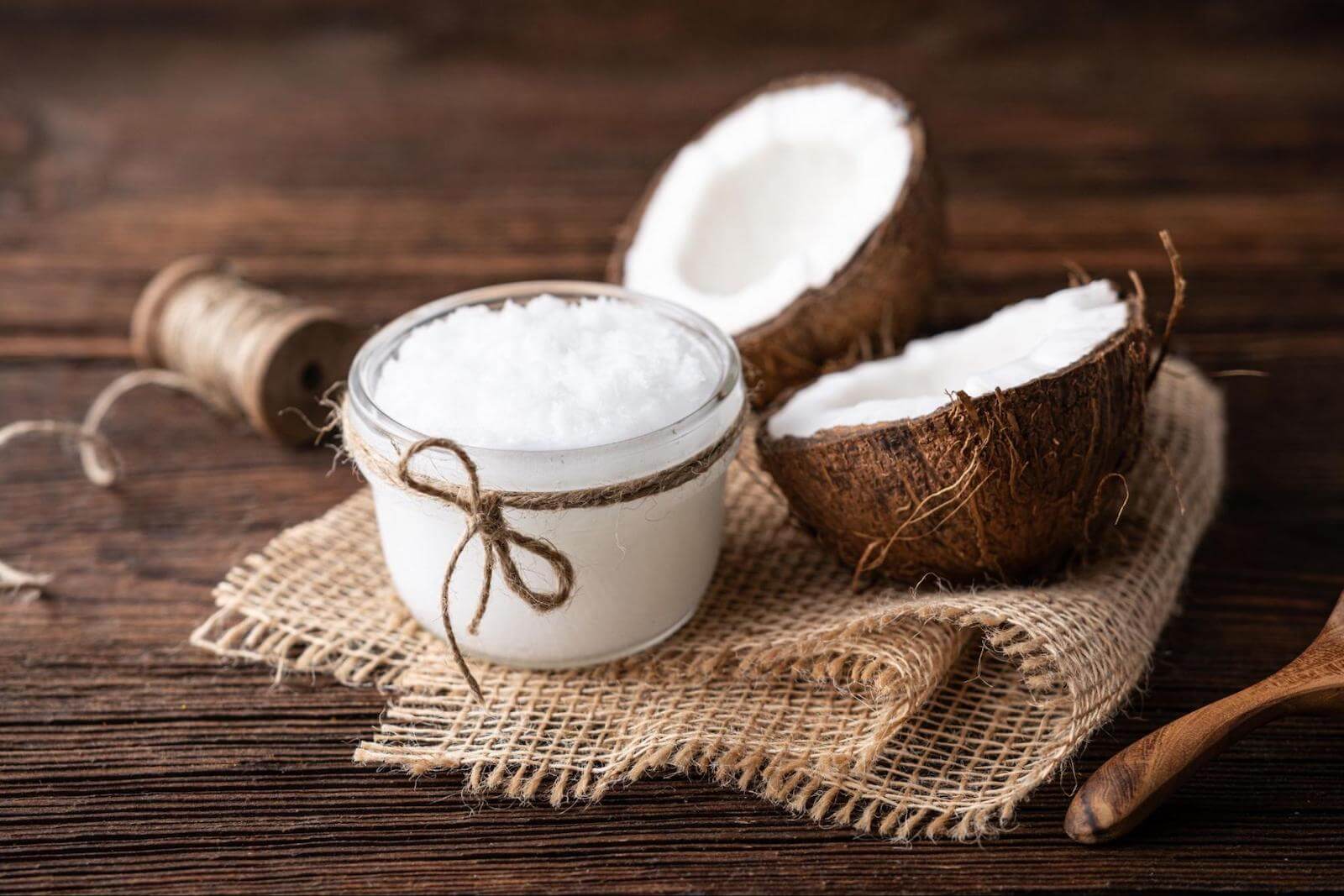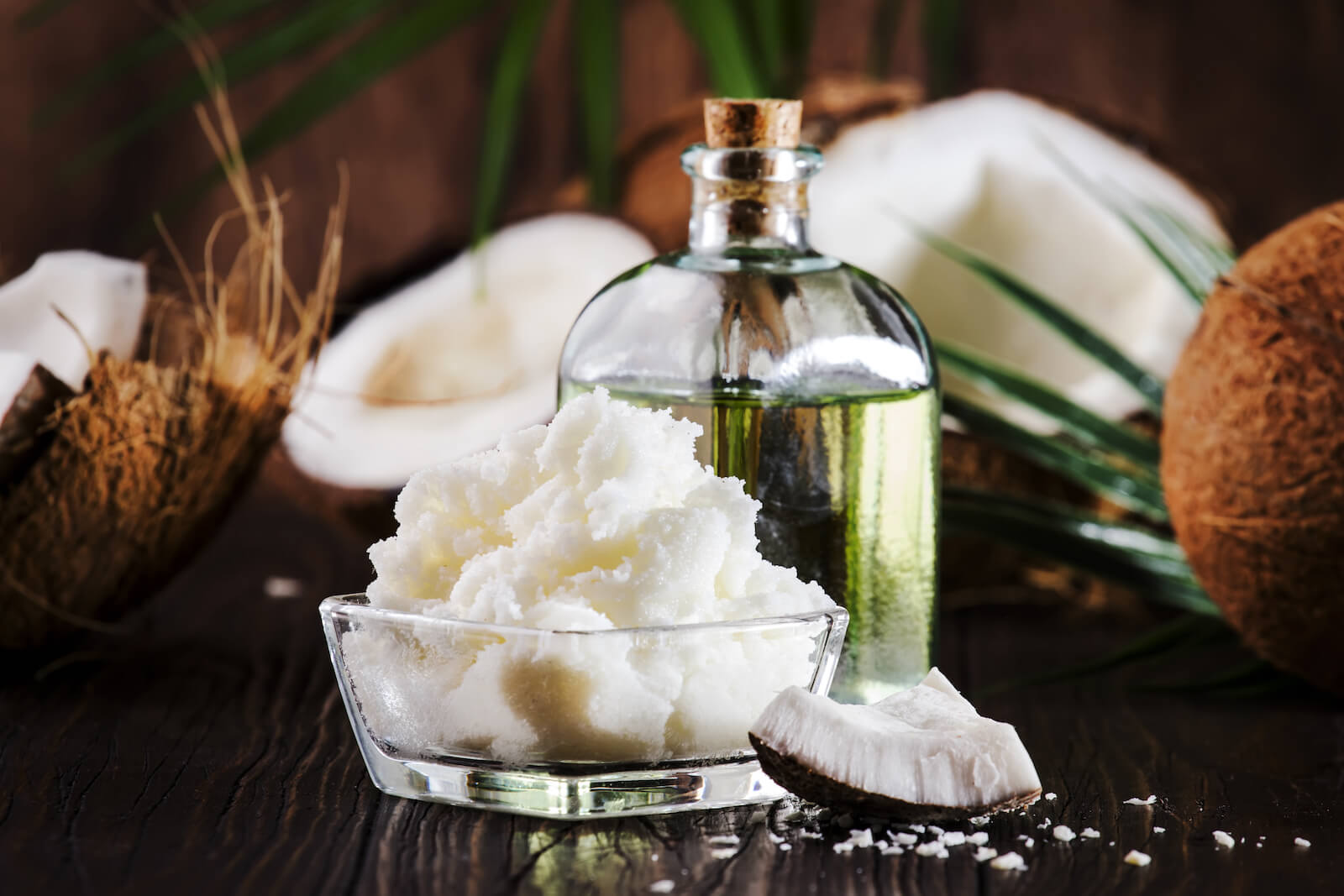How to Use MCT Oil to Improve Your Physical and Cognitive Health
How MCT Oil Can Improve Your Health Without Negative Side Effects
- What Is MCT Oil?|
- How to Use MCT Oil|
- How Much MCT Oil Should You Take|
- Health Benefits|
- Who Shouldn’t Use MCT Oil|
- Nutritional Uses|
- Learning how to use MCT oil is easy. Add it to drinks, salad dressings, and use it in cooking.
- Start adding MCT oil to your diet slowly, about one teaspoon per meal, to avoid stomach distress.
- MCT oil has been shown to improve good cholesterol (HDL), which may reduce the risk of heart disease.
- MCT oil can improve cognitive function in people with Alzheimer’s and type 1 diabetes.
- MCT oil is not for everyone, particularly for those with chronic diabetic ketoacidosis or cirrhosis of the liver.

MCT oil has become very popular in the last few years. Many people put it in their coffee, meal replacement shakes, and even on salads. If you are wondering when and how to use MCT oil to improve your health, we’re here to help.
How to Use MCT Oil in Your Daily Diet
There are many simple ways to use MCT oil in your daily life, including adding it to smoothies, coffee, and using it in cooking.
MCT oil and coconut oil have lower smoke points (oxidation points) than conventional frying oils, which means that they are best used for baking and medium-heat sauteing. In general, fats with a smoke point below 392°F (200° C) are not good for frying [1]. The smoke point for coconut oil is 350.6°F (177°C) and 302°F (150°C) for MCT oil [1].
Most people do not cook a lot with MCT oil as it is more expensive than coconut oil, does not have much flavor, and has an even lower smoke point than coconut oil. So, here are a few simple ways to add MCT oil in the form of MCT oil or coconut oil to your diet:
- Blend an MCT oil powder into smoothies, meal replacement shakes, teas, or coffee.
- Use unrefined coconut oil to roast vegetables (at no higher than 350°F). Unrefined coconut oil is processed differently from coconut meat that is filtered and dried before being made into oil, so it does not have a coconut flavor.
- Add MCT or coconut oil and butter to your morning coffee to make bulletproof coffee.
- Make a salad dressing with ¼ cup apple cider vinegar, ¼ cup olive oil, ½ cup MCT oil, salt, and pepper.
- Add coconut oil to curries or soups to add a coconut flavor, such as with Thai Tom Kha Gai coconut chicken soup.
- Make fried plantains, as they fry well in shallow oil at a medium heat.
- If you are on a keto diet, you can find numerous recipes for keto “fat bombs” (small snacks primarily made of fat) made with MCT oil.

How Much MCT Oil Should You Take?
It’s best to take MCT oil spread out throughout the day, in doses of about one tablespoon per meal [2, 3]. One tablespoon is generally about 15 mL of MCT oil.
Consuming too much MCT oil too quickly can lead to digestive symptoms including stomach pain, diarrhea, and bloating, so it’s best to work your way up more slowly.
Many people want to know how to use MCT oil without getting this common stomach discomfort. It often happens when we add a larger amount of any fat to our diet that we are used to. These digestive system issues can be easily resolved by slowly increasing your dose of MCT oil over time.
Try just a teaspoon in your morning coffee for a week or two and see how you do. If you do not have any digestive symptoms, then increase your intake by ¼ – ½ of a teaspoon each week until you reach your desired amount. Don’t go over about 1 tablespoon per serving.
When using MCT oil as a dietary supplement, the daily dose should not exceed 100 mL per day. Seven tablespoons a day (about 100 mL) is the limit for digestive tolerance in most people [2].
What Is MCT Oil?
A key part of learning how to use MCT oil is understanding the difference between MCT oil and coconut oil. The simplest way to remember it is that coconut oil contains MCT oil, but MCT oil alone is not coconut oil.
The MCT oil we buy in stores comes from coconut and/or palm kernel oils. It contains two types of MCTs (medium-chain triglycerides): 50%-80% caprylic acid and 20%-50% capric acid [4].
There are three to four types of medium-chain triglycerides, including the two found in MCT oil. Medium-chain triglycerides are saturated fatty acids which are characterized by their 6-12-carbon chains [5, 6].
MCT oil is found in dairy fat, coconut oil and palm oil. Manufactured pure MCT oil, which we can now buy in stores, is commonly made from coconut and palm oil [4].
What makes medium-chain triglycerides (and MCT oils) so interesting and effective for improving health is how they are processed in and used by the body [2, 5, 7, 8]:
- They are water soluble, so they can pass through intestinal cell membranes into the portal vein to the liver, which immediately metabolizes them and turns them into ketones for immediate fuel for the body and brain.
- Due to its almost complete metabolism by the liver, very little of the fat of MCT oil is stored in the body as fat.
- The body does not need to use bile acid and digestive lipase to absorb MCT oil, like it does with LCT (long chain triglycerides).
The body’s ability to quickly use MCT oil for ketone production that can then be used as an alternate source of energy for the body and brain (as opposed to glucose) is partly why MCT oil has so many health benefits. Some people even report an energy boost due to MCT oil.
Health Benefits of MCT Oil

There are many reasons why you may want to add MCT oil into your diet. It can aid in weight loss, help maintain stable insulin levels, and improve cognition in people with dementia.
Let’s take a look at some of the main health benefits of MCT oil:
- MCT oil can improve cognitive function in people with Alzheimer’s as well as for type-1 diabetics [9, 10, 11]. This might be because ketones, which are produced as you digest MCT oil, can quickly and easily be used by the brain for fuel and because it can regulate insulin levels.
- MCT oil can aid in weight loss. While many people think eating any fat results in more body fat, MCT oil isn’t stored as fat. On the contrary, some people lose about a pound over three weeks. It can also help regulate the hunger hormone ghrelin [12, 13].
- Due to using ketones for fuel instead of glucose, MCT oil may improve insulin resistance (when cells are unable to use the insulin provided by our food because of high carbohydrate intake) and regulate blood sugar levels [14, 15, 16].
- MCT oil can be a good source of fat for people who struggle to digest fat (fat malabsorption) because it does not require bile acid or digestive lipase for absorption [5, 8]. Patients should still take a supplement to make sure they are getting all of the essential fatty acids [17].
- MCT oil can moderately increase “good cholesterol” (HDL) by 0.11 mmol/L. This sounds small, but an increase of just 0.025 mmol/L reduces the associated risk of cardiovascular disease by 2%-3% [18].
As you can see, MCT oil can be very beneficial to your health, particularly if you are looking to improve cognition, stabilize blood sugar, or lose weight.
The best benefits of MCT oil are seen when they are combined with a moderate or low-carb diet or even a ketogenic diet. If you eat a high carbohydrate diet and use MCT oil, you can still struggle with insulin resistance and satiety (feeling full after eating), even if you also have ketones to use as fuel.
Eating a moderate carb Paleo diet and adding some MCT oil can be a great combination for improving health.
Who Shouldn’t Use MCT Oil

Some claim that eating more MCT oil is part of a fad diet, and, because MCT oil is a saturated fat, that it can be harmful.
It is true that just like every health intervention, MCT oil is not suited for everyone. Let’s look at when you may not want to use MCT oil:
- Patients with uncontrolled diabetic ketoacidosis should not use MCT oil, as it does increase ketone levels in the blood [17].
- People who have liver cirrhosis should be careful when using MCT oil because the liver is needed to clear medium-chain fatty acids [8, 19].
- If you have an allergy or sensitivity to coconut, MCT oil would not be a good choice for you [3].
When looking at the issue of MCT being a saturated fat and possible heart disease risk, the research shows that MCT oil does not negatively affect cholesterol ratios in most people. In fact, as mentioned earlier, MCT oil can slightly increase good cholesterol, possibly reducing risk of heart disease [18].
At the same time, very little research has been done about long-term daily use of MCT oil, and it would be good to have some long-term studies.
In general, it is best practice to get your cholesterol ratios checked each year, whether you use MCT oil daily or not.
Nutritional Use of MCT Oil

MCT oil is a great healthy fat to add to your diet as well as improve cognitive function, level out glucose levels, aid in weight management, and help you feel full and satisfied all day.
Remember to add MCT oil to your diet slowly, with small amounts at a time (starting at around a teaspoon) with food throughout the day. However, don’t go over 7 tablespoons in a day or 1 tablespoon per serving at a given meal, drink, or snack.
Get creative with using MCT oil. Invent your own salad dressings, make a high-fat tea, or replace butter with coconut oil on your sweet potato. If you are interested in getting help with your diet, reach out to our clinic to help you navigate your new diet.
As with all lifestyle changes, it is still important to work with a healthcare professional to make sure the change is right for you, and get your cholesterol levels checked yearly.
We hope this article helped you simplify the confusion over how to use MCT oil effectively and safely.
Dr. Michael Ruscio is a DC, natural health provider, researcher, and clinician. He serves as an Adjunct Professor at the University of Bridgeport and has published numerous papers in scientific journals as well as the book Healthy Gut, Healthy You. He also founded the Ruscio Institute of Functional Health, where he helps patients with a wide range of GI conditions and serves as the Head of Research.➕ References
- Boateng L, Ansong R, Owusu WB, Steiner-Asiedu M. Coconut oil and palm oil’s role in nutrition, health and national development: A review. Ghana Med J. 2016 Sep;50(3):189–96. PMID: 27752194. PMCID: PMC5044790.
- Shah ND, Limketkai BN. The Use of Medium-Chain Triglyceridesin Gastrointestinal Disorders. Pract Gastroenterol. 2017 Feb;NUTRITION ISSUES IN GASTROENTEROLOGY(SERIES #160):20–8.
- Medium chain triglycerides: Drug information [Internet]. Medium chain triglycerides: Drug information. Available from: https://somepomed.org/articulos/contents/mobipreview.htm?28/46/29420
- Medium-chain triglycerides Research Breakdown | Examine.com [Internet]. Available from: https://examine.com/supplements/MCTs/research/#sources-and-composition_physicochemical-properties
- Ruppin DC, Middleton WR. Clinical use of medium chain triglycerides. Drugs. 1980 Sep;20(3):216–24. DOI: 10.2165/00003495-198020030-00005. PMID: 7428670.
- Łoś-Rycharska E, Kieraszewicz Z, Czerwionka-Szaflarska M. Medium chain triglycerides (MCT) formulas in paediatric and allergological practice. Prz Gastroenterol. 2016 Jul 20;11(4):226–31. DOI: 10.5114/pg.2016.61374. PMID: 28053676. PMCID: PMC5209465.
- Fernando WMADB, Martins IJ, Goozee KG, Brennan CS, Jayasena V, Martins RN. The role of dietary coconut for the prevention and treatment of Alzheimer’s disease: potential mechanisms of action. Br J Nutr. 2015 Jul 14;114(1):1–14. DOI: 10.1017/S0007114515001452. PMID: 25997382.
- Gracey M, Burke V, Anderson CM. Medium chain triglycerides in paediatric practice. Arch Dis Child. 1970 Aug;45(242):445–52. DOI: 10.1136/adc.45.242.445. PMID: 4918706. PMCID: PMC1647651.
- Juby AG, Blackburn TE, Mager DR. Use of medium chain triglyceride (MCT) oil in subjects with Alzheimer’s disease: A randomized, double-blind, placebo-controlled, crossover study, with an open-label extension. Alzheimers Dement (N Y). 2022 Mar 14;8(1):e12259. doi: 10.1002/trc2.12259. PMID: 35310527; PMCID: PMC8919247.
- Page KA, Williamson A, Yu N, McNay EC, Dzuira J, McCrimmon RJ, et al. Medium-chain fatty acids improve cognitive function in intensively treated type 1 diabetic patients and support in vitro synaptic transmission during acute hypoglycemia. Diabetes. 2009 May;58(5):1237–44. DOI: 10.2337/db08-1557. PMID: 19223595. PMCID: PMC2671041.
- Avgerinos KI, Egan JM, Mattson MP, Kapogiannis D. Medium Chain Triglycerides induce mild ketosis and may improve cognition in Alzheimer’s disease. A systematic review and meta-analysis of human studies. Ageing Res Rev. 2020 Mar;58:101001. DOI: 10.1016/j.arr.2019.101001. PMID: 31870908. PMCID: PMC7050425.
- Mumme K, Stonehouse W. Effects of medium-chain triglycerides on weight loss and body composition: a meta-analysis of randomized controlled trials. J Acad Nutr Diet. 2015 Feb;115(2):249–63. DOI: 10.1016/j.jand.2014.10.022. PMID: 25636220.
- Lemarié F, Beauchamp E, Legrand P, Rioux V. Revisiting the metabolism and physiological functions of caprylic acid (C8:0) with special focus on ghrelin octanoylation. Biochimie. 2016 Jan;120:40–8. DOI: 10.1016/j.biochi.2015.08.002. PMID: 26253695.
- Eckel RH, Hanson AS, Chen AY, Berman JN, Yost TJ, Brass EP. Dietary substitution of medium-chain triglycerides improves insulin-mediated glucose metabolism in NIDDM subjects. Diabetes. 1992 May;41(5):641–7. PMID: 1568535.
- Han JR, Deng B, Sun J, Chen CG, Corkey BE, Kirkland JL, et al. Effects of dietary medium-chain triglyceride on weight loss and insulin sensitivity in a group of moderately overweight free-living type 2 diabetic Chinese subjects. Metab Clin Exp. 2007 Jul;56(7):985–91. DOI: 10.1016/j.metabol.2007.03.005. PMID: 17570262.
- Geng S, Zhu W, Xie C, Li X, Wu J, Liang Z, et al. Medium-chain triglyceride ameliorates insulin resistance and inflammation in high fat diet-induced obese mice. Eur J Nutr. 2016 Apr;55(3):931–40. DOI: 10.1007/s00394-015-0907-0. PMID: 25911003.
- ASPEN Board of Directors and the Clinical Guidelines Task Force. Guidelines for the use of parenteral and enteral nutrition in adult and pediatric patients. JPEN J Parenter Enteral Nutr. 2002 Feb;26(1 Suppl):1SA-138SA. DOI: 10.1177/0148607102026001011. PMID: 11841046.
- Panth N, Abbott KA, Dias CB, Wynne K, Garg ML. Differential effects of medium- and long-chain saturated fatty acids on blood lipid profile: a systematic review and meta-analysis. Am J Clin Nutr. 2018 Oct 1;108(4):675–87. DOI: 10.1093/ajcn/nqy167. PMID: 30239550.
- Morgan MH, Bolton CH, Morris JS, Read AE. Medium chain triglycerides and hepatic encephalopathy. Gut. 1974 Mar;15(3):180–4. PMID: 4841275. PMCID: PMC1412890.
Discussion
I care about answering your questions and sharing my knowledge with you. Leave a comment or connect with me on social media asking any health question you may have and I just might incorporate it into our next listener questions podcast episode just for you!